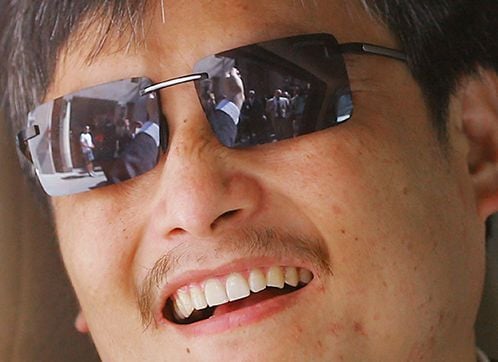You have /5 articles left.
Sign up for a free account or log in.

Does China have too much influence over academe in the West?
Source: Getty Images
Chinese dissident Chen Guangcheng’s assertion that New York University has been pressured by Chinese officials to force him out of the institution has raised broader questions about whether American academe is being unduly influenced by China’s government. Even as NYU denies the specific charges raised by Chen, others say that the general problem of pressure on American universities is real and troublesome.
Chen, a lawyer and critic of China’s family planning policies whose escape from house arrest to the U.S. Embassy in 2012 provoked a diplomatic crisis, maintains that the Chinese government has exerted “great, unrelenting pressure” on NYU with the objective of complicating his ability to make a living and engage in human rights advocacy. The New York Times has reported that Chen was frustrated by what he perceived as NYU's efforts to manage his advocacy, including a (failed) attempt to dissuade him from traveling to Washington last August, a trip on which his two NYU translators refused to cooperate with an interviewer from Radio Free Asia.
NYU has denied the allegations, stating that the fellowship was only ever intended to be for one year (as in fact is common for scholar rescue fellowships, which are typically one to two years in duration). During that year, NYU says, it provided Chen with housing, food, and insurance, as well as other benefits including specially arranged tutorials in law, English lessons, and translation services. The university also provided a "select list" of Chen's media interviews and public appearances to counter the allegation that his advocacy-related activities were restrained. "Mr. Chen’s fellowship at NYU and its conclusion have had nothing to do with the Chinese government,” John Beckman, the university’s spokesman, said in a statement.
Jerome Cohen, a NYU law professor who assisted Chen in arranging the fellowship, has also defended the university, telling Foreign Policy that he has seen no evidence of Chinese government interference in this instance. "You shouldn't bite the hand that feeds you," Cohen added.
The details regarding Chen’s fellowship at NYU therefore remain in dispute. But some China scholars say that Chen’s broader point about the substantial influence the Chinese government wields over American academe is worth noting -- regardless of the details of his situation. In the statement he released to the media (available in full on The Wall Street Journal website), Chen wrote: “The work of the Chinese Communists within academic circles in the United States is far greater than what people imagine, and some scholars have no option but to hold themselves back. Academic independence and academic freedom in the United States are being greatly threatened by a totalitarian regime.”
“I think that’s basically right,” said Perry Link, a professor at the University of California at Riverside who is among the China scholars who have been blacklisted from obtaining visas to conduct research in China. Link did say, however, that the words "greatly threatened" seemed to him a little over the top. “It is a big problem, and it’s a long-term problem, and it’s a subtle problem. It’s gotten dramatized in the last few days as a university kicking out a blind human rights lawyer at the behest of a totalitarian government." (Chen is blind.) "This is spectacular, almost Hollywood-ized, but that’s not the way it works. The influence problem is pervasive and serious but it doesn’t happen that way.”
“It happens when scholars are induced, whether for fear of not getting visas or because of the lure of getting money, to censor themselves and not raise questions that they otherwise would raise and to speak using words that they know would be acceptable in Beijing rather than words they would view as being more accurate,” said Link, who noted, for example, that the massacre in Tiananmen Square (a subject of his own research) is frequently described by scholars as an “event” or “incident” or even by a Chinese word meaning "tempest in a teapot."
“Chen is absolutely right when he says that the Chinese government has influenced intellectual freedom in the West," said Maochun Yu, a professor of history at the United States Naval Academy. "On the other hand, this is not NYU’s problem. It’s a larger problem."
"A lot of American universities want to have broader contact with China in terms of academic exchange, in terms of getting more Chinese students to pay full tuition to American campuses. They want to keep the Chinese government in good graces. They don’t want to offend the Chinese government," Yu said, noting, for example, that a university with a joint academic program with a Chinese university would "know better" than to invite the Dalai Lama to give a talk. (Here's one cautionary tale: after the University of Calgary granted the Dalai Lama an honorary degree, the Chinese Ministry of Education removed the Canadian institution from its approved universities list for more than a year, as The Calgary Herald has reported.)
At the same time, Yu said that "sometimes you never know whether you might or might not offend the Chinese government. That’s why the unknowing would impose even greater censorship. You would take a minimum risk and the best way to take a minimum risk is not to do anything that might be remotely considered risky."
"A large part of this is that a university just does not want to jeopardize its access,” said June Teufel Dreyer, a professor of political science at the University of Miami. “Universities are really concerned to give their students an international education and China is regarded, perhaps erroneously and perhaps prematurely, as a country we really need to get to know a lot better because of the way its economy is growing and because of the influence it has on the environment. So you don’t want to be shut off from China and you want your students to have these experiences with Chinese students and of learning the Chinese language and if you see that jeopardized by something you don’t have to do anyway – [i.e.,] extending this dissident’s stay -- you’re probably going to decide in the direction of not extending his stay. We don’t have to assume evil here. I don’t think anybody gets to be president of a university or provost or dean without being somewhat political, and political people are going to weigh options and probably decide it’s the better part of wisdom to not extend that appointment.”
NYU is more deeply invested in China than most: its campus in Shanghai is slated to open this fall. The campus was first announced in March 2011 and it received final approval from the Chinese Ministry of Education last October -- after Chen’s fellowship began. University administrators have expressed their commitment to academic freedom at the Shanghai campus, a joint venture with East China Normal University.
However, Cary Nelson, the past president of the American Association of University Professors and a professor of English at the University of Illinois at Urbana-Champaign, said that academic freedom as it exists in the U.S. simply doesn’t exist in China. (For proof of that, consider recent news of a list of seven topics that Chinese university professors have been instructed not to discuss -- topics including mistakes of the Communist Party and civil rights.)
"Engaging in compromised educational enterprises in China – and I think these are compromised educational enterprises fueled by money and potential for profit – you pay a price back home and that price will increase over time,” Nelson said. “It’s not as if people can sustain two entirely different value systems as if one were for the left brain and one for the right brain. If you can make compromises abroad, what’s to prevent you from making compromises here?"
Hongshan Li, a professor of history at Kent State University who has published on U.S.-China educational relations, cautioned, however, that academic collaboration is predicated on the act of influence. “Educational exchange by definition is basically two sides wanting to share their values and their systems, their ways of doing things, so influencing the other is a part of it -- whether you like it or not,” said Li. "In the end it will probably depend on which side will provide a system that will be more willingly accepted by students.”








